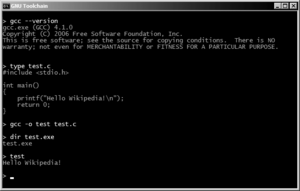DJGPP
 |
|

The DJGPP environment, utilizing GCC
|
|
| Developer(s) | DJ Delorie |
|---|---|
| Stable release |
2.0.5 / November 3, 2015
|
| Repository | www |
| Operating system | DOS and Windows |
| Type | Compiler |
| License | GNU GPL |
| Website | www |
DJ's GNU Programming Platform (DJGPP) is a software development suite for Intel 80386-level and above, IBM PC compatibles which supports DOS operating systems. It is guided by DJ Delorie, who began the project in 1989. It is a port of the GNU Compiler Collection (GCC), and mostly GNU utilities such as Bash, find, tar, ls, GAWK, sed, and ld to DOS Protected Mode Interface (DPMI). Supported languages include C, C++, Objective-C/C++, Ada, Fortran, and Pascal. DJGPP was described as an "aging" product in 2004.
The compiler generates 32-bit code, which runs natively in 32-bit protected mode while switching back to 16-bit DOS calls for basic OS support. However, unlike the Open Watcom C/C++ compiler, it is not a zero-based flat model due to preferring NULL pointer protection for better stability. It is currently based upon a variant of the COFF format. It can access up to 4 GB of RAM in pure DOS when using a suitable DPMI host (e.g., CWSDPMI r7 or HDPMI32).
DJGPP presents the programmer an interface which is compatible with the ANSI C and C99 standards, DOS APIs, and an older POSIX-like environment. Compiled binaries are long filename (LFN) aware and can handle such names under most 32-bit Windows by default, but they cannot use the Win16 or Win32 APIs that graphical programs on Windows need.Terminate and Stay Resident (TSR) programs to support LFNs under plain DOS or Windows NT 4 are available.
...
Wikipedia
